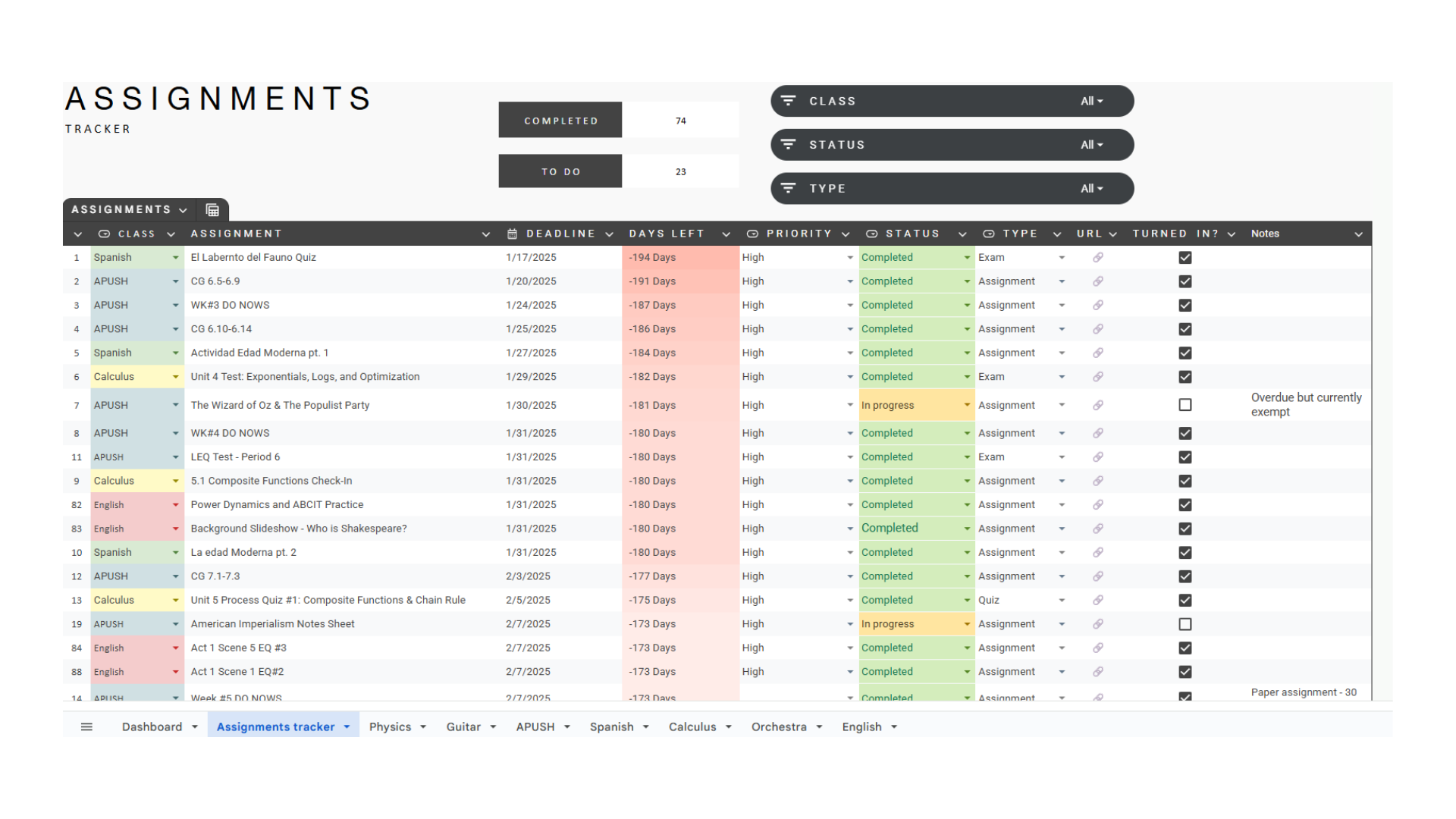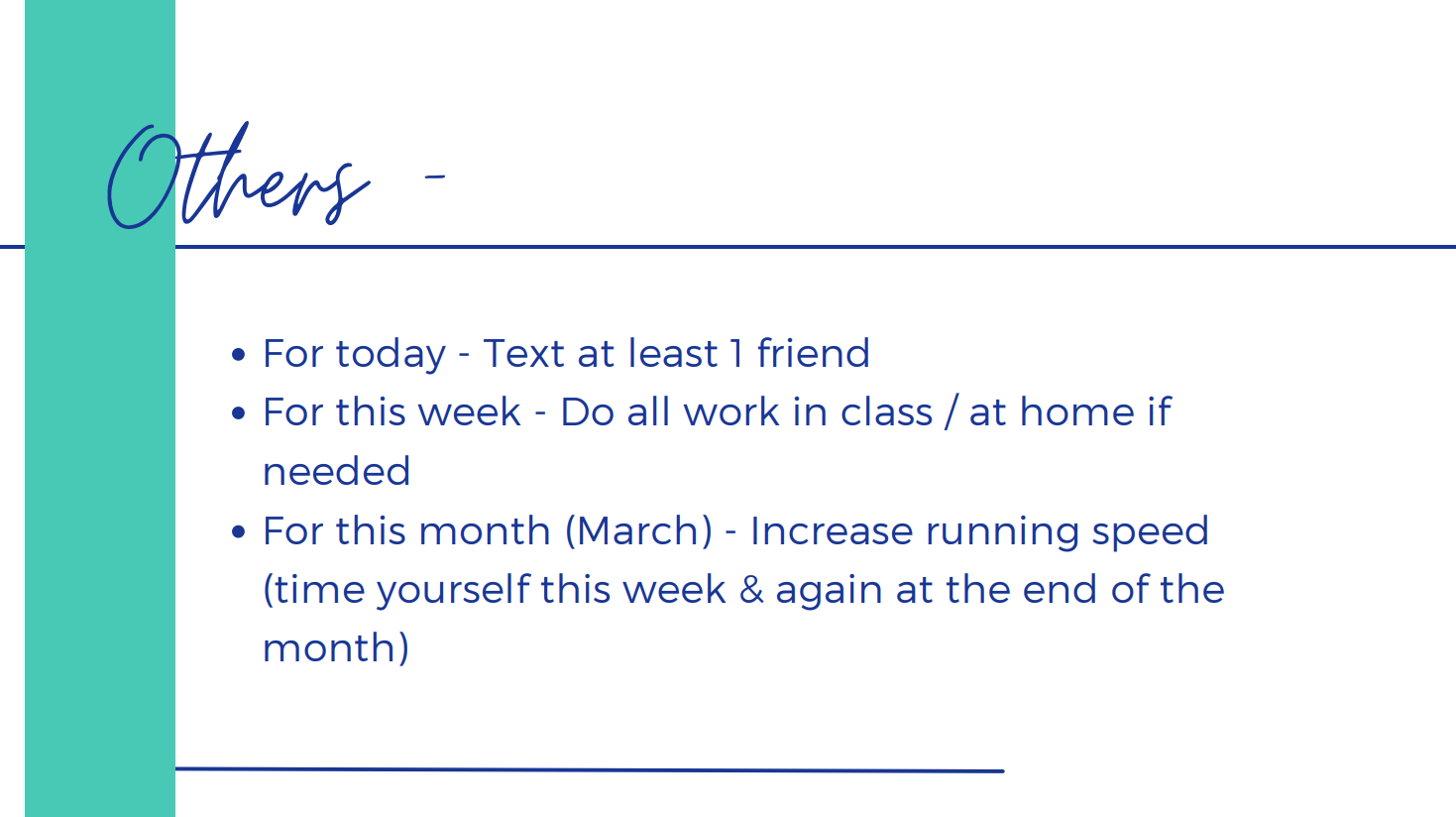How We Structure Executive Functioning Sessions to Support Real Growth
At our clinic, Executive Functioning (EF) sessions are designed to do more than just help students manage their homework. We focus on building lifelong skills that support independence, confidence, and success, both academically and personally.
Every session is personalized, but we follow a consistent structure to ensure students get the most out of their time with us. Here’s a behind-the-scenes look at how we do it, using one of our student slides and weekly assignment trackers as an example.
1. Start with a Goal Check-In
We open each session by checking in on long-term and short-term goals. These goals are created with the student and reflect their priorities, not just academic ones.
For example, one student outlined three long-term goals:
Maintain As and Bs in every class
Improve soccer skills
Stay in touch with long-distance friends
We then guide students through reflection questions like:
Why is this goal important to me?
What will I gain if I achieve it?
What obstacles might get in my way?
How am I prioritizing this right now?
How motivated am I this week?
These questions help students strengthen their self-awareness, a critical EF skill, and remind them that academic success isn’t isolated, it’s part of a bigger picture.
2. Regulation & Attention Check-In
Executive functioning isn’t just about organization; it’s also about emotional regulation and sustained attention.
Each week, we ask:
How have you generally felt this week?
Have any emotions interfered with your work?
What strategies have you used to center yourself (e.g., movement, meditation, journaling)?
This opens the door to discussing stress, overwhelm, and strategies to regulate big feelings before they derail productivity. These are conversations many teens aren’t having anywhere else, and they’re game-changing. It’s important to note that we stay high-level here, as we are not mental health therapists.
3. Assignment Review with a Visual Tracker
We then shift into reviewing the student’s online learning platforms, like Powerschool or Schoology, and use a visual Assignment Tracker to organize what’s overdue, upcoming, or unclear.
The tracker includes:
A dashboard of all classes
Specific overdue or upcoming tasks
Clarifying notes (e.g., "Submitted but not graded yet")
Space to prioritize action steps
By pulling everything into one place, we reduce overwhelm and help the student develop planning, organization, and task initiation skills. Students leave with a clear action plan (and often, a deep breath of relief.)
4. Project Management for Bigger Goals
For students who are juggling multiple responsibilities or long-term projects, we may introduce tools like Asana. This project management platform helps break big goals into smaller, concrete steps with deadlines and checkboxes. It’s especially helpful for students working on:
College applications
Multi-step research projects
Passion projects or job applications
Balancing extracurriculars with academics
We guide students through the process of mapping out their work, setting milestones, and tracking progress, all while building confidence in their ability to manage independently.
5. Closing with Next Steps & Accountability
Before wrapping up, we set clear intentions for the week:
One thing to do today
One thing to complete this week
A strategy or habit to try this month
We also check in on how they’ll hold themselves accountable. Some students use our built-in checklists. Others check in with a parent or teacher. And for many, simply knowing we’ll review it next session gives them the nudge they need.
Why It Works
This structure balances consistency with personalization. It helps students feel seen, supported, and capable while developing the skills they’ll need long after they leave our clinic. They’re not just keeping up with school. They’re learning how to manage their lives.
What Our EF Program Looks Like in Practice
We offer our Executive Functioning support as a 12-session package each Fall and Spring semester, designed to provide just the right amount of consistency and support without feeling overwhelming for students or families.
Each semester includes:
One Pre-Assessment Session to establish current strengths, needs, and baseline goals and to walk through our step-by-step process
Ten Weekly Coaching Sessions focused on real-time academic demands, project management, goal setting, emotional regulation, and strategy use
One Post-Assessment Session to measure growth, celebrate wins, and set a plan for continued independence
This structured approach ensures students build momentum, reflect on their progress, and walk away with tools they can use across every area of life. Whether your student is navigating a demanding course load, recovering from missing assignments, or simply trying to stay organized and focused, we can help!
If your child could benefit from structured support with planning, time management, or emotional regulation, our Executive Functioning sessions might be a great fit. Reach out to schedule a consultation; we’d love to learn more about how we can help.




